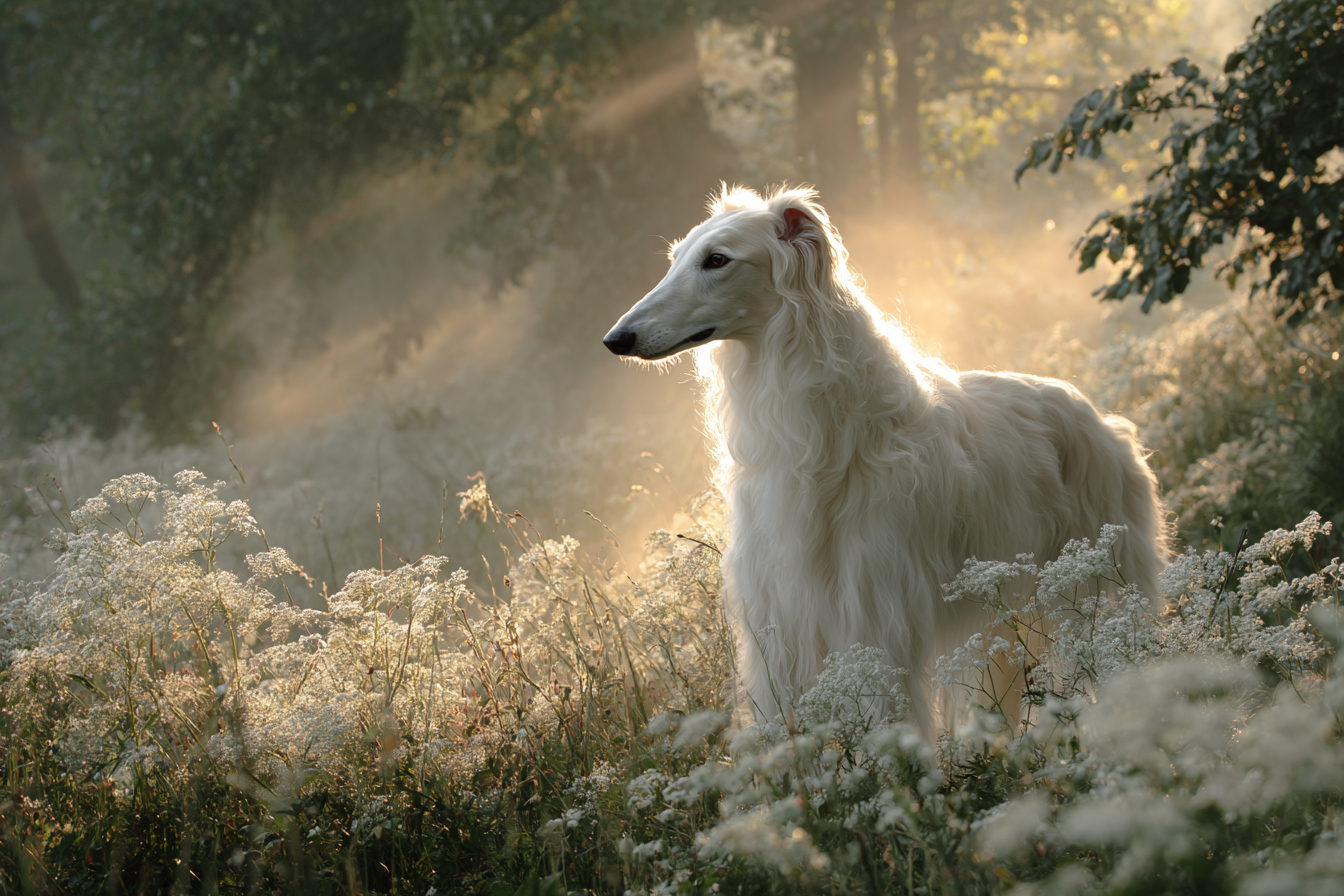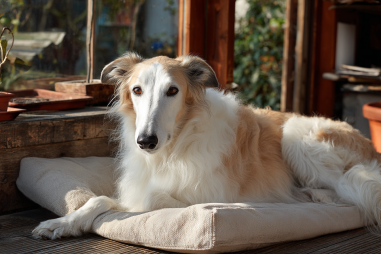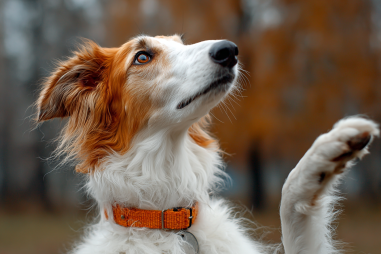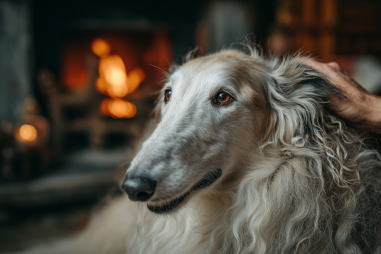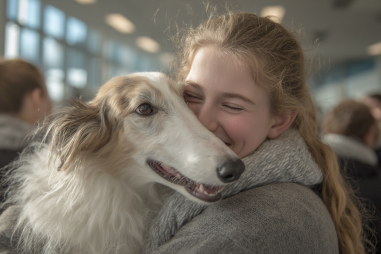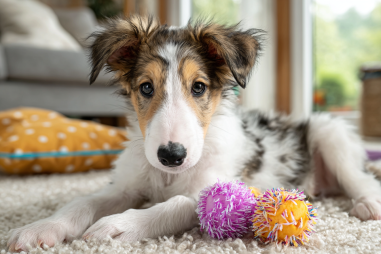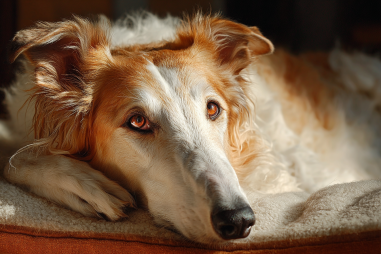The Borzoi, also known as the Russian Wolfhound, is a breed that immediately captures attention with its graceful build and serene demeanor. This elegant sighthound has a rich history rooted in Russian aristocracy and hunting traditions, admired for both its striking appearance and refined personality. Understanding Borzoi breed characteristics gives insight into what makes these dogs truly unique companions. Let’s explore their physical traits, temperament, exercise needs, and more to appreciate why Borzois are so special.
Physical Traits: Size, Coat, and Colors
One of the first things people notice about the Borzoi is their distinctive, regal appearance. These dogs boast a tall, slender, and athletic frame designed for speed and agility. Adult males typically stand between 28 to 32 inches tall at the shoulder, while females are slightly smaller, averaging 26 to 30 inches. Weight usually ranges from 60 to 105 pounds, depending on gender and individual build.
The Borzoi’s coat is another defining characteristic. Their long, silky fur flows smoothly, often described as almost wavy or feathered, adding to their elegant look. This coat not only adds beauty but also provides protection from harsh weather conditions, reflecting their origins in the cold Russian climate. Often, the fur around the neck and chest is especially thick and forms a mane-like ruff that enhances their noble silhouette.
As for coloration, Borzois come in an array of beautiful patterns and colors. Common colors include white, golden, tan, gray, brindle, black, and various mixtures and markings of these shades. This variety in coat color underscores how each Borzoi can have a unique and striking appearance, while all maintaining the breed’s signature grace.
Temperament and Personality
Despite their aristocratic appearance, Borzois are known for their gentle and calm temperament. They tend to be quiet dogs, rarely barking unless necessary, which makes them excellent companions for those seeking a serene household pet. While they can be somewhat reserved or aloof with strangers, Borzois form deep bonds with their families and display affection and loyalty in subtle, dignified ways.
One of their most charming traits is their sensitivity. Borzois are typically quite intuitive and respond well to gentle training methods and a calm environment. They generally get along well with children and other pets, particularly if socialized from an early age. However, their strong prey drive—stemming from their history as hunting dogs—means they may instinctively chase small animals, so supervision with cats or smaller pets is advisable.
Because of their independent streak, Borzois can sometimes come across as a bit aloof or stubborn, especially if training is inconsistent. However, with patience, positive reinforcement, and clear communication, they thrive as well-mannered pets. Their grace, intelligence, and gentle nature make them a beloved breed among enthusiasts who appreciate both beauty and brains.
Exercise Needs and Activity Level
Though Borzois are built for speed and have an impressive burst of energy, their overall activity level is relatively moderate compared to some other sporting breeds. They enjoy daily exercise, including walks and opportunities to run in secure, fenced areas. Importantly, Borzois are sprinters rather than endurance runners—they love short bursts of vigorous activity but tire quickly afterward.
Without proper exercise, Borzois may become bored or restless, so a balanced routine that includes playtime and mental stimulation is essential. However, many Borzoi owners appreciate their dog’s tendency to be calm and relaxed indoors, often enjoying long naps after moderate activity. This combination of athleticism and tranquility means they fit well in a variety of living situations, from spacious country homes to apartments—provided their exercise needs are met.
Common Health Considerations
Like all breeds, Borzois have specific health concerns that potential owners should be aware of to ensure their dogs live long, happy lives. Generally considered a healthy breed, Borzois have a lifespan of around 10 to 12 years. Some of the common health issues that can affect Borzois include:
- Bloat (Gastric Dilatation-Volvulus): As a deep-chested breed, Borzois are prone to this serious digestive condition, which requires immediate veterinary attention.
- Heart Problems: Dilated cardiomyopathy, a disease affecting the heart muscle, is sometimes seen in the breed.
- Hip Dysplasia: Though less common than in other large breeds, hip dysplasia can affect Borzois and lead to joint discomfort.
- Eye Conditions: Progressive retinal atrophy and cataracts can occasionally occur, warranting regular veterinary eye exams.
Reputable breeders typically conduct health screenings to minimize these risks. Responsible owners should provide routine veterinary care, a balanced diet, and appropriate exercise to maintain their dog’s health. Additionally, given their long coat, regular grooming is important to prevent matting and maintain skin health.
Reflecting on the Borzoi’s Unique Traits
When you step back and consider the Borzoi breed characteristics as a whole, it becomes clear why this breed has captivated dog lovers for centuries. Their striking physical beauty, paired with a peaceful and noble temperament, creates a harmonious balance between elegance and warmth. Their unique combination of being both an active and calm companion allows them to fit comfortably into many types of homes and lifestyles.
Whether it’s their smooth, flowing coats, gentle eye expression, or quiet loyalty, Borzois possess qualities that leave a lasting impression. They are a breed that requires thoughtful care and respect for their independent nature, but those who take the time to understand them are rewarded with a remarkable partner that exemplifies grace, intelligence, and heartfelt companionship.

